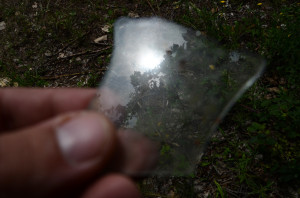I find Anja Utler’s poetry beautiful beyond words – almost literally, because when I listen to her reciting her poetry, I do so without paying conscious attention to her language, but rather, allow the rhythms and any surface or underlying meaning(s) to enter my mind – or rather my superconsciousness, on an intuitive level. Of course, even describing this process is challenging as at each moment of listening, and as I report the process, I’m not absolutely clear whether how I am engaging with the reading (in this case) is actually at a conscious level or not. However, even without picking out the individual words, I know beyond question that this poetry is resonating strongly with me on an emotional and spiritual level. In many ways the relationship with this particular poet’s writing (and performance of it) is similar to the relationship that I might have with certain musicians and their work – where I don’t know what it is precisely about the music that is affecting me, but at the same time I know that, unquestionably, it is allowing me to tap in to a well of joy. In the UK there is a rather strange attitude towards the German language, with a common view being that the language is ‚harsh‘ or ‚guttural‘ – a view that is derived from exposure to a plethora of war movies and documentaries about a period of history 70 years ago. I always oppose these views – pointing out the beauty of the German language … perhaps this recording would be a first step in convincing those who do not already know it of the validity of such a view.
Author Archive:
2014 30 März
Meipuru Siropu and Coffee
Bob T Bright | Filed under: Blog | RSS 2.0 | TB | Comments off
Sometimes it’s a good sign that it’s not easy (or even possible) to write about something wonderful: this is a case in point (or as far as the poet’s performances of his spontaneous creativity / writing is concerned – a point encased) – namely – here – a performance by the Japanese poet Gozo Yoshimasu, who I was recently fortunate enough to see perform with Marilya Corbot at Cafe Oto in Dalston. The music is by Scott Fraser:
The Honor of Virtue
by Charles Bernstein
What I say is what I meant
& what I saw is what I said
But neither seen nor spoke
Is what I think I thought
(from ‚Recalculating‚ (2013))
- Witch – Leslie Winer (re-release)
- Roundup Ready – Leslie Winer
- Greco Chante Brel – Juliette Greco
- There’s A Dream I’ve Been Saving: Lee Hazlewood Industries 1966 – 1971 – Lee Hazlewood
- A Bad Wind Blows in my Heart – Bill Ryder Jones
- Volume 3 – She and Him
- Sound System – the Clash
- Crimson / Red – Prefab Sprout
- AM – Arctic Monkeys
- The Next Day – David Bowie
- Random Access Memories – Daft Punk
- Take Me to the Land of Hell – Yoko Ono
- 1979 NOW! – Vic Godard and Subway Sect
- Sticky Wickets – The Duckworth Lewis Method
- White Light / White Heat – Super Deluxe [Box Set] – Velvet Underground
- In St Cuthbert’s Time – Chris Watson
- Understated – Edwyn Collins
- Songs Cycled – Van Dyke Parks
- The Complete LHI Recordings – Honey LTD
- Personal Record – Eleanor Friedberger
2013 5 Nov.
I’ve not got the foggiest notion why I like Foggy Notion – but I do
Bob T Bright | Filed under: Blog | RSS 2.0 | TB | 6 Comments
Like so many people I felt that Lou Reed’s recent death was a great loss and one which seemed even more perceptible with each passing day. I think that I was more into the Velvet Underground than Lou Reed’s solo work – but this is nothing to do with the quality of his solo work, which is great – it’s just that there’s sometimes a limit to what there is time to listen to.
The track that I have always loved most of the Velvets is ‚Foggy Notion‘ – but I don’t know why … and this is perhaps the answer … it’s precisely the fact that I can’t say why I love it so much that explains why I love it. I can’t readily point to the emotion that it excites in me; I can’t say even what the song is about – because I have never really listened closely to the lyrics. What I can say is that when I listen to the song I get a sense of carefree playing and singing – almost as though the song were being made up on the spot (and who knows (or cares) if it was?) … there are references to calamine lotion – which is something that is very familiar … though I don’t really know what it is for … some references to Sally Mae and (I realise as I write this) some references to hitting her ‚harder harder harder‘ – Ooh dear … nothing sinister I hope … but where the narrative is going I don’t know. There are countless other songs by Lou Reed / the Velvets that are probably more memorable – or even ‚better‘ but sometimes you just need a song that you can’t get a handle on – one that remains chimerically foggy.
leslie winer ©’s 1990 release ‚Witch‘ – which is hard to find (depending on which Witch you’re after) is available to download. Words are good, but when other words don’t do them justice ears are better.

Here is an American Haiku to celebrate:
a night canvas
a sheer cut
misses a spectre

A quality of Leslie Winer’s work is that it resists or defies any analysis that could really come close to revealing its dynamic, questioning nature. In the same way that the songs themselves demonstrate the struggle to capture the elusive noumenon of objects, feelings or experiences, so the language that is necessary to describe both the music and the words is inevitably drawn towards (and, as a look at reviews elsewhere will show) must resort to easy analogies or trite categorisation. To really grapple with these songs’ concerns is to enter a vertiginous, dizzying, but exhilarating vortex where, if there are any ‘answers’ then these are not to be found on the level of language (the Soviet psychologist Vygotsky compared a thought to ‘a cloud shedding a shower of words’) – which is merely the point of departure ; better to follow the example of the characters in the Ealing comedy the Lavender Hill Mob, whose descent down the spiral staircase of the Eiffel tower – shedding accoutrements en route, gives them the opportunity to achieve an altered state of consciousness by letting themselves ‘be’ in the moment – beyond thought-language-reason and enter into something that looks like pure joy – or madness. Dunderhead, for example, the fourth track on the Purity Supreme ep ‚Always Already‘ – a collaboration between Leslie Winer and Christophe Van Huffel, could easily be labelled with the nearest glib adjective such as ‘cinematic’ or ‘macabre’ etc. or use references to ‘Badlands’ or ‘Deliverance’ (just as I have myself made an (easy?) reference to an Ealing film) and yet whilst it is not hard to see why those labels/references might be used, to do so would not be so much to scratch the surface, as to gorge on the surface alone – to the neglect of everything else – like a pig hunting truffles (well, a not particularly well trained pig). In Japan there is a bath toy that resembles a bar of soap and which, when immersed in the water, begins to spin, effervesce and disintegrate, to eventually reveal the plastic thing concealed within. This track – as with each of the other three songs on the ep, works in a similar way; except that the fizzing, coruscating nature of each, as its concerns are addressed – I hesitate to say ‘revealed’, is ongoing – and whatever „meaning“ can be inferred has to be continually revised – refusing to yield to the final death knoll of any fixed interpretation. The concern is with the liminal – with exploring the reality (the word itself is inadequate) that whatever we experience or perceive can only be unsatisfactorily described through fallible words and senses. The words used are just the shed skin of the thing that was experienced.
Each song on the ep is ‘about’ ‘being about’ things – and the references within the songs reflect this: ‘what you notice is the flaw’; ‘The words that I like. Are you revolting’? (‘revolting’ could be the sense of the dynamism of words themselves as they are constantly interpreted and their meanings fixed and then reassessed; their limitations and their recalcitrant nature – Scott Walker likens his own relationship to words as that of a military commander to his troops: where the troops can as easily run amok as meet their military objectives; or it could simply mean ‘revolting’ – in the literal sense of being ‘nauseating’) This view of words recalls the work of French New Novelist authors such as Nathalie Sarraute or Alain Robbe-Grillet. There are repetitions of very precise references to specific moments in time and place (in Milk ST. and ‘Half Past 3 Cowboy’, and yet, as a line in the former puts it: ‘the more specific you get, the more general you’ll be’. As in other songs in her earlier work, statements are made which are overt assertions of certainty: ‘This is….’ or ‘I am….’ and whatever the predicate happens to be – but at the same time this certainty somehow seems to undermine itself and be rendered unobtainable. At the end of Dunderhead the woods woman too is subverting her own narrative – if that’s what it is, by almost caricaturing it in an hallucinatory, playful, riffing manner.
This might give the impression of a dry, intellectual exercise, but the converse is true: there are some drily funny lines; ‘I got a couple of drops of Indian blood, mostly on my hands’; ‘I got a tiny phial of ‘come to me’ & a gallon of ‘get the fuck out’; ‘Mama’s got a brand new fag’; there is brio, attitude, empathy and anger. For me the most affecting song is ‘Famous Inhabitants of Louth’. I have no idea what the references are to, but it doesn’t seem to matter – this is a song that contains joy, sadness, yearning and mirth. The seemingly (and possibly consciously) aleatoric references to the residents of a Lincolnshire town – accompanied on a voyage by an orchestra and cow, to acting as an intermediary for in-fighting pirates, to flies ‘locked in a JSTOR-logo embrace’ and to ‘English sweat’ might seem to be a recipe for distancing or losing the listener altogether – but instead they captivate – cerebrally and emotionally: who would have thought that a detailed description of a Mr Pig watch costing 21 quid could move you to tears? There is something beautiful and pathetic in the meticulous description of this banal object. The music itself is suitably fractured, dramatic or understated – conventional in parts or idiosyncratic elsewhere and the incanted narration is snarled or plangent, playful or vituperative, according to the inflection that the words demand. As the final track says – ‘it’s all good‘.
I’m not sure how many people have listened to this ep, but I hope that it gets the exposure, love and critical praise it should – because listening to music doesn’t get much more stimulating and enjoyable than this.
Here is a Leslie Winer track with some JJ Cale and Samuel Beckett from her own site:


